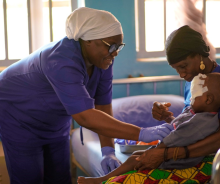Noma: a deadly Neglected Tropical Disease that should not exist
Sokoto, 31 January, 2024 - At age 6, Shamudeen Umaru’s (name changed) face was severely disfigured by noma, a life-threatening disease that primarily affects children under the age of 10.
“The disease started suddenly with a toothache and within a few days, his face had been destroyed. This affected his eating and drinking because most of the food and water poured out from his mouth’’, said Shamudeen’s mother, Fatima Umaru, from Munwadata, Lela Ward, Sokoto State, Northwest Nigeria.
Shamudeen was lucky to have received treatment at the Noma Children's Hospital in Sokoto State. Unfortunately, the disease had already destroyed his lower jaw and the soft tissues of his cheeks and nose, making him require several reconstructive surgeries.
“Face of poverty”
Noma, described as “the face of poverty”, is a severe grangerous disease of the mouth and face primarily affecting malnourished young children (between the ages of 2 and 6 years) in regions of extreme poverty.
The non-infectious disease starts as a swelling of the gum, which if not treated early, spreads quickly to destroy the facial tissue and bones when left untreated. The disease claims the lives of between 70 and 90 per cent of those affected, while survivors are left with varying degrees of facial deformities, thereby, impairing their smiles, facial appearance, speech, and eating depending on the extent of the facial damage, consequently, causing social stigma.
“ Over the past 15 years of caring for Noma patients, I have witnessed the devasting impact the disease has on the lives of the children and their parents, said Fatima Uba, a nursing officer.
She said Noma is known as a poverty disease because it affects poor, malnourished children with poor oral health hygiene.
“The disease is treatable with antibiotics and nutritional support when detected early. Cases are often presented at late stages due to the lack of awareness about the disease. Deliberate effort needs to be taken to increase awareness about noma and other NTDs among the communities, and health workers to be able to eliminate these diseases”, she added.
Elimination efforts
To better address this deadly disease, in 2023, the World Health Organization included NOMA in its official list of Neglected Tropical Diseases (NTDs). The request for the official recognition of Noma by the WHO was spearheaded by the Nigerian government and supported by 32 member states from five WHO regions and partners.
Currently, there are 21 diseases on the WHO’s NTD list. The NTDs are caused by different organisms, including viruses, bacteria, parasites, fungi and toxins and have devastating health, social and economic consequences on the people.
WHO estimates that NTDs affect more than 1 billion people, while the number of people requiring NTD interventions (both preventive and curative) is 1.6 billion.
Through collaboration with Medicins Sans Frontieres (MSF), the Noma Children’s Hospital, since 2014 has been providing free treatment including surgeries for Noma patients in Nigeria. Additionally, Hilfskation Noma e.V in collaboration with the Federal Ministry of Health and the National Hospital, commissioned a new Noma treatment center. This will bring much-needed succour to Noma patients as all services rendered are free.
Meanwhile, the WHO continues to support the Federal Ministry Of Health (FMOH) to foster strong collaboration in the fight against Noma in the health sector and beyond by strengthening the multisectoral technical working group on noma, building the capacity of health workers, especially at the primary healthcare level, enlightening community mobilization officers and traditional rulers towards the prevention and control of Noma.
With funding support from Hilfskation Noma e.V., the WHO AFRO Regional Noma Program, supported the FMOH and other key stakeholders to develop and implement the 2019-2025 National Noma Triennial Plan. The plan serves as a road map for the country towards Noma prevention and control.
To mark the 2024 World Neglected Tropical Diseases Day (WNTDD), the WHO Country Representative, Dr Walter Kazadi Mulumbo said “ I congratulate the Government of Nigeria for spearheading the campaign to move Noma to the NTDs list. This movement will bring about much-needed awareness, catalyse research, stimulate funding, and boost efforts to control the disease through multisectoral and multi-pronged approaches. Noma is a disease that should not exist and all hands must be on deck to eradicate it”
World NTD Day is marked on 30 January every year. The commemoration aims to raise awareness of NTDs, and the suffering they cause and gather support towards their control, elimination and eradication, in line with the programmatic targets set out in the NTD road map 2021−2030 and the commitments of the 2022 Kigali declaration on neglected tropical diseases.




